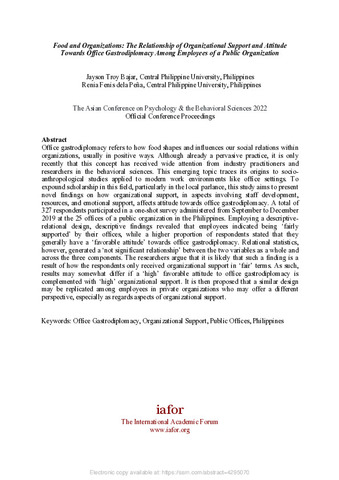Ipakita ang simpleng tala ng item
Food and organizations: The relationship of organizational support and attitude towards office gastrodiplomacy among employees of a public organization
| dc.contributor.author | Bajar, Jayson Troy F. | |
| dc.contributor.author | Dela Peña, Renia F. | |
| dc.date.accessioned | 2023-02-01T06:40:48Z | |
| dc.date.available | 2023-02-01T06:40:48Z | |
| dc.date.issued | 2022-12-20 | |
| dc.identifier.citation | Bajar, J. T. F. & Dela Peña, R. F. (2022). Food and organizations: The relationship of organizational support and attitude towards office gastrodiplomacy among employees of a public organization [Conference paper]. In The Asian Conference on Psychology & the Behavioral Sciences 2022 Official Conference Proceedings (pp. 19-30). The International Academic Forum. http://dx.doi.org/10.2139/ssrn.4295070 | en_US |
| dc.identifier.issn | 2187-4743 | |
| dc.identifier.uri | https://hdl.handle.net/20.500.12852/2443 | |
| dc.description | Conference paper | en_US |
| dc.description.abstract | Office gastrodiplomacy refers to how food shapes and influences our social relations within organizations, usually in positive ways. Although already a pervasive practice, it is only recently that this concept has received wide attention from industry practitioners and researchers in the behavioral sciences. This emerging topic traces its origins to socioanthropological studies applied to modern work environments like office settings. To expound scholarship in this field, particularly in the local parlance, this study aims to present novel findings on how organizational support, in aspects involving staff development, resources, and emotional support, affects attitude towards office gastrodiplomacy. A total of 327 respondents participated in a one-shot survey administered from September to December 2019 at the 25 offices of a public organization in the Philippines. Employing a descriptiverelational design, descriptive findings revealed that employees indicated being ‘fairly supported’ by their offices, while a higher proportion of respondents stated that they generally have a ‘favorable attitude’ towards office gastrodiplomacy. Relational statistics, however, generated a ‘not significant relationship’ between the two variables as a whole and across the three components. The researchers argue that it is likely that such a finding is a result of how the respondents only received organizational support in ‘fair’ terms. As such, results may somewhat differ if a ‘high’ favorable attitude to office gastrodiplomacy is complemented with ‘high’ organizational support. It is then proposed that a similar design may be replicated among employees in private organizations who may offer a different perspective, especially as regards aspects of organizational support. | en_US |
| dc.language.iso | en | en_US |
| dc.relation.uri | https://papers.ssrn.com/sol3/Delivery.cfm/SSRN_ID4295070_code2312301.pdf?abstractid=4295070&mirid=1&type=2 | en_US |
| dc.subject.lcsh | Philippines | en_US |
| dc.subject.lcsh | Food--Social aspects | en_US |
| dc.subject.lcsh | Food | en_US |
| dc.subject.lcsh | Employees--Attitudes | en_US |
| dc.subject.lcsh | Civil service | en_US |
| dc.subject.lcsh | Civil service--Attitudes | en_US |
| dc.subject.lcsh | Interpersonal relations | en_US |
| dc.title | Food and organizations: The relationship of organizational support and attitude towards office gastrodiplomacy among employees of a public organization | en_US |
| dc.type | Conference paper | en_US |
| dcterms.accessRights | Publicly accessible | en_US |
| dc.citation.firstpage | 19 | en_US |
| dc.citation.lastpage | 30 | en_US |
| local.subject | Office gastrodiplomacy | en_US |
| local.subject | Organizational support | en_US |
| local.subject | Public offices | en_US |
| dc.identifier.doi | 10.2139/ssrn.4295070 | |
| dc.citation.conferencetitle | The Asian Conference on Psychology & the Behavioral Sciences 2022 Official Conference Proceedings | en_US |


